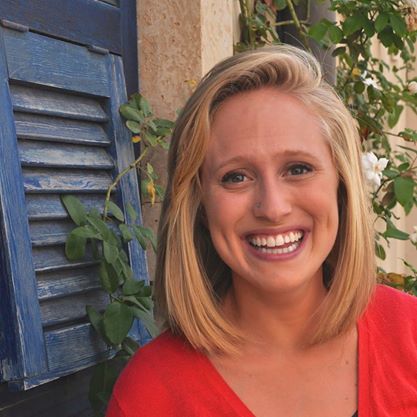Please enjoy a D’var Torah this week from Louisa Kornblatt, Rosh Bogrim 2016. After graduating from Washington University in St. Louis in May of 2014, having majored in Women, Gender and Sexuality studies and minored in theater and Spanish, Louisa was a Dorot Fellow in 2014-2015 in Tel Aviv. Originally from Madison, WI, and a lifelong Ramahnik, Louisa made aliyah (moved to Israel and became an Israeli citizen) last August and now lives, works, and creates art in Tel Aviv. Reflections on Shabbat Zachor by Louisa Kornblatt
This Shabbat we not only start the book of Leviticus, but also jump forward to Deuteronomy for the maftir – the 8th reading – to usher in the holiday of Purim. The Shabbat preceding Purim is called Shabbat Zachor (Shabbat Remembrance). It is one of four special Shabbatot (Sabbaths) during the year that prepare us for the holiday of Passover by reading from a different section of the Torah. Though Purim is a holiday associated with silly costumes, delicious hamentashen, and raucous noise-making, it has a dark beginning. In the maftir this week (Deuteronomy 25:17-19), we will read about how the Amalekites attacked the Israelites and targeted the weakest members of the community by approaching from the rear. We visit this section in the Torah before Purim because Haman, the arch-villain of the Purim story, is believed to have descended from the Amalekites. Haman attempted to wipe out the Jewish people, and Shabbat Zachor reminds us of how the Amalekites almost managed to do the same:
| יז זָכוֹר, אֵת אֲשֶׁר-עָשָׂה לְךָ עֲמָלֵק, בַּדֶּרֶךְ, בְּצֵאתְכֶם מִמִּצְרָיִם. | 17 Remember what Amalek did to you on the way as you came forth out of Egypt; |
| יח אֲשֶׁר קָרְךָ בַּדֶּרֶךְ, וַיְזַנֵּב בְּךָ כָּל-הַנֶּחֱשָׁלִים אַחֲרֶיךָ–וְאַתָּה, עָיֵף וְיָגֵעַ; וְלֹא יָרֵא, אֱלֹהִים. | 18 how he met you by the way, and smote the hindmost of your people, all that were enfeebled in your rear, when you were faint and weary; and they feared not God. |
| יט וְהָיָה בְּהָנִיחַ יְהוָה אֱלֹהֶיךָ לְךָ מִכָּל-אֹיְבֶיךָ מִסָּבִיב, בָּאָרֶץ אֲשֶׁר יְהוָה-אֱלֹהֶיךָ נֹתֵן לְךָ נַחֲלָה לְרִשְׁתָּהּ–תִּמְחֶה אֶת-זֵכֶר עֲמָלֵק, מִתַּחַת הַשָּׁמָיִם; לֹא, תִּשְׁכָּח. {פ} | 19 Therefore it shall be, when the LORD your God has given you rest from all your enemies round about, in the land which the LORD your God gives you for an inheritance to possess it, that you shall blot out the remembrance of Amalek from under heaven; you shall not forget |
If the passage from Deuteronomy leaves any doubt as to the meaning of God’s instructions, the haftarah (Prophetic) portion we read on Shabbat Zachor (Samuel I 15:1-35) explicitly fills in the gaps. God names Saul king, but then regrets this choice when Saul does not fully follow God’s command to demolish the Amalekites. Instead of “utterly destroy[ing] the sinners the Amalekites” (Samuel I 15:18) as God commanded, Saul spares Agag, king of the Amalekites, and the best of the livestock. The bloodiness continues when the Prophet Samuel learns of Saul’s actions and “hew[s] Agag in pieces before the Lord” (Samuel I 15: 34).
There is no way around the fact that Shabbat Zachor is quite troubling. God instructs us to “blot out the remembrance” of an entire people. We boo each time Haman’s name is read from the megillah (Scroll of Esther) for his efforts to eradicate the Jews, and yet God wants us to do the same to the Amalekites? From a simple reading of the text, it seems like God supports genocide. Where is the merciful God who listens when Abraham pleads to save Sodom and Gomorrah (Genesis 18:16-33) because of the possibility of the existence of just ten righteous people amongst a sea of evil?
I read and reread the above passage from Deuteronomy and the haftarah from this week, each time hoping to find a sliver of light in the darkness. I searched for commentaries that would soften God’s words and interpretations that would justify such a harsh and stringent command. Scholars and sages have long struggled to explain God’s wishes. Rabbi Irving Greenberg argues in his book, The Jewish Way: Living the Holidays, that the emphasis should be placed on God’s command to remember. He explains that while many people today would rather “forgive and forget,” Shabbat Zachor teaches us “that true reconciliation comes through repentance and remembrance. Confronting the evils of the past is the most powerful generator of moral cleansing and fundamental reconciliation. Repentance is the key to overcoming the evils of the past. When people recognize injustice they can correct the wrongdoing and the conditions that lead to it.” However, I am simply not satisfied by these explanations. I just cannot reconcile God’s order to exterminate an entire people, even if they tried to do so first to the Israelites.
What I love about the Judaism that I have grown up with is that I do not have to accept these interpretations. It is at Camp Ramah that I really began to understand that I can form an opinion of my own. My relationship with God is already quite fraught as a modern day Jew, and I have every right to disagree with the God that resides in Deuteronomy chapter 25. Camp creates a space where we can dive into these troubling texts. Instead of pretending like these difficult sections are not a part of our tradition or denouncing them all together, we have the opportunity to dialogue and draw our own conclusions. It is this intellectual freedom and commitment to text that brings me back to camp each summer.
Shabbat Shalom and Chag Purim Sameach.






